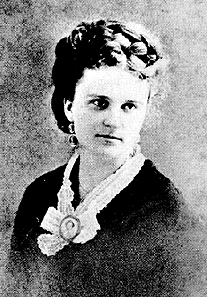Francesca Cricchio
Journal for The Storm
English 48
February 28th, 2011
“He pushed her hair back from her face that was warm and steaming. Her lips were as red and moist as a pomegranate seed. Her white neck and a glimpse of her full, firm bosom disturbed him powerfully.” (533).
“Kate Chopin went beyond Maupassant's technique and style and gave her writing a flavor of its own. She had an ability to perceive life and put it down on paper creatively. She put much concentration and emphasis on women's lives and their continual struggles to create an identity of their own within the boundaries of the patriarchy.” (Biography of Kate Chopin from Wikipedia).
The short story, “The Storm”, by Kate Chopin opens with a four-year-old boy named Bibi and his father ,Bobinot, stuck in a store while a treacherous storm emerges. Meanwhile, Bibi’s mother and Bobinot’s wife, Calixta, is at home sewing and not at all concerned with the storm heading her way. She realizes after a while that the storm is very close by and she rushes to her front porch to close the windows and retrieve the clothes that are hanging outside to dry. As she does this Alcee arrives. The sexual tension between the two is clearly evident with lines such as “His voice and her own startled her as if from a trance, and she seized Bobonet’s vest” (532). Calixta invites Alcee inside, and from then on the two are face to face with temptation for one another. Calixta grows scared as the storm approaches, and she falls into Alcee’s open arms. The two make love, and then the storm passes. The lovers part separate ways with smiles on their faces, and in the end of this short story Calixta is seen sitting at the kitchen table with her family where they “laughed much and so loud that anyone might have heard them” (534). Alcee, who is also very happy, writes to his wife Clarisse, and tells her to take her time away. Clarisse is very satisfied with this letter, and feels like she has discovered a new-found freedom.
This story was very interesting, because at first I was not okay with the affair that had happened. The two seemed so nonchalant about it all, and there was no sense of remorse for the act they committed. After cheating on their husband and wife, the two feel nothing more than a smile on their face. But after some thinking, I realized that this story was actually very pivotal to both Calixta and Clarisse’s lives.
Calixta is seen in the beginning of the story as a hard working woman. She has “no uneasiness for their safety” (531), as if she were on auto-pilot or something. With no passion or excitement in her life, she spends her night working “furiously on a sewing machine” (531). It quickly becomes evident how Calixta is so transfixed on the role of mother and wife that she has no passion, no worry, no happiness. Then Alcee arrives and everything changes. Alcee brings out her “vivacity” (532) and Chopin writes “her blue eyes still retained their melting quality” (532). Suddenly, Calixta is no longer a boring housewife, but a woman of passion who avoids all social norms! This is something that I think Chopin strived for in her writing. It’s dangerous affairs that help women like Calixta “search for selfhood, for self-discovery or identity” (quote from Kate Chopin’s biography website).
Also, Clarisse finds freedom and strength in herself when her husband writes to her. Although her husband has cheated, and she is unaware, both her and Alcee have benefited tremendously. Alcee has found passion and love that is without commitment. This new focus on Calixta has given Clarisse the freedom to focus on herself, which gives her empowerment to find out who she really is.
Overall, I thought that Chopin’s ideals were revolutionary. Although they were beyond social norms of the time, they were real and honest. To me, Chopin was saying what everyone was thinking at the time, but too afraid to come to terms with. Being risque isn’t always a bad thing. It can benefit everyone so that our lives become enriched with passion (even if they are a little sinful).


